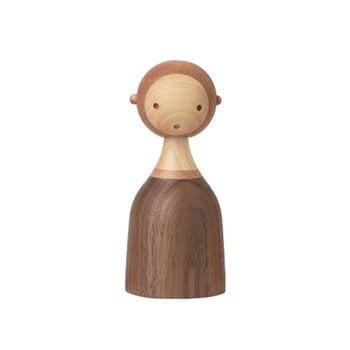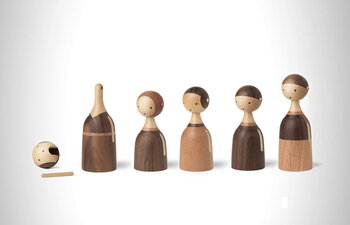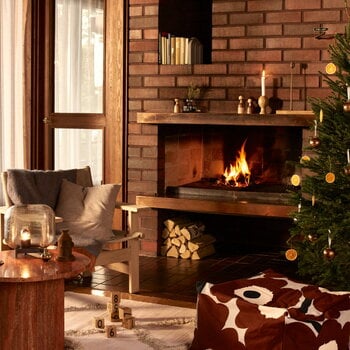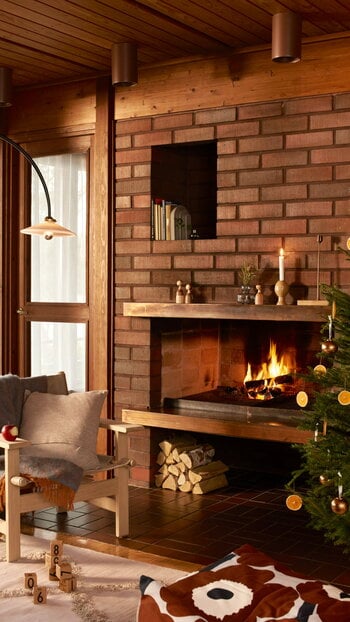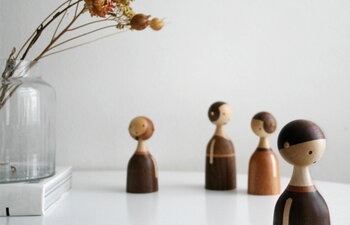Architectmade’s Kin Baby reminds us of the importance of family as well as the fact that families come in many forms. You can pick and choose between the different wooden characters to create a group of your liking. The adorable Kin figurines, designed by Lars Beller Fjetland, are made of walnut, mahogany and maple.
Kin Baby figurine
Architectmade
Description
Architectmade’s Kin Baby reminds us of the importance of family as well as the fact that families come in many forms. You can pick and choose between the different wooden characters to create a group of your liking. The adorable Kin figurines, designed by Lars Beller Fjetland, are made of walnut, mahogany and maple.
Product details (3)
- Material
- Walnut, mahogany and maple wood
- Colour
- Natural
- Height
- 10.6 cm
- Product ID
Designer
Lars Beller Fjetland grew up on the west coast of Norway, where he has nurtured a lifelong fascination for the marriage of function with the finest of nature's materials in furniture, interiors and lighting. He established his self-entitled Design office Beller design in 2011 while still being a student at Bergen Academy of Art and Design. He had his breakthrough in 2013 as he launched four of his latest designs at the annual Salone de mobile.
Read moreReviews (0)
Sustainability
The Product Sustainability Framework, our criteria of sustainable design, helps you find the most sustainable products in our selection. Read below which sustainability criteria this product has met.
Working conditions & labour 7/9
-
Equal opportunities for all employees
-
Commitment to UN Global Compact, fair compensation for all employees
-
Corporate responsibility requirements defined and communicated for suppliers
-
Systematic work for improved inclusion and well-being in the workplace
-
Transparent supply chain
-
Suppliers' compliance to a code of conduct ensured
-
Compliance to the UN Guiding Principles on Business and Human Rights ensured in the supply chain
Eco-friendly production 9/9
-
Fair and resource-wise water-use in production
-
No incineration or landfilling of returned items
-
No use of endangered species as materials
-
No direct environmental emissions or waste (excl. GHGs) from production
-
The sustainability of direct suppliers' production is addressed and monitored
-
Production and material sourcing that respect biodiversity, animal rights, and natural ecosystems
-
Material-efficient and ecological packaging
-
Positive impact on nature’s well-being through operations that regenerate natural ecosystems
-
No potentially harmful chemicals used in own production
Climate impact 5/8
-
Company's direct greenhouse gas emissions identified and commitment to reduction
-
Product's carbon impact identified and commitment to reduction
-
Guidance on energy- and eco-efficient use of the product
-
Contribution to climate initiatives beyond the brand’s direct operations
-
Low-carbon or compensated transportation
Sustainable materials 6/6
-
Sustainable and long-lasting material choices
-
No harmful or hazardous substances
-
Responsible raw material sourcing and production
-
Materials suited for circularity: monomaterials, recyclable finishings, renewable or recycled contents etc.
-
Ecological materials: natural, biodegradable, recyclable or recycled contents
-
Outstanding materials in terms of innovativeness, responsibility, sustainability and circularity: local production or sourcing, 100 % recycled content, C2C-certification etc.
Circular design 5/5
-
High aesthetic quality promoting long-term use of the product
-
Technically durable product design and material choices
-
Design for enduring life-long quality
-
Design and support for product maintenance, repair and upgradability
-
Innovative circular design solutions: circular service system, resale platform, remanufacturing, collection of used products, etc.

